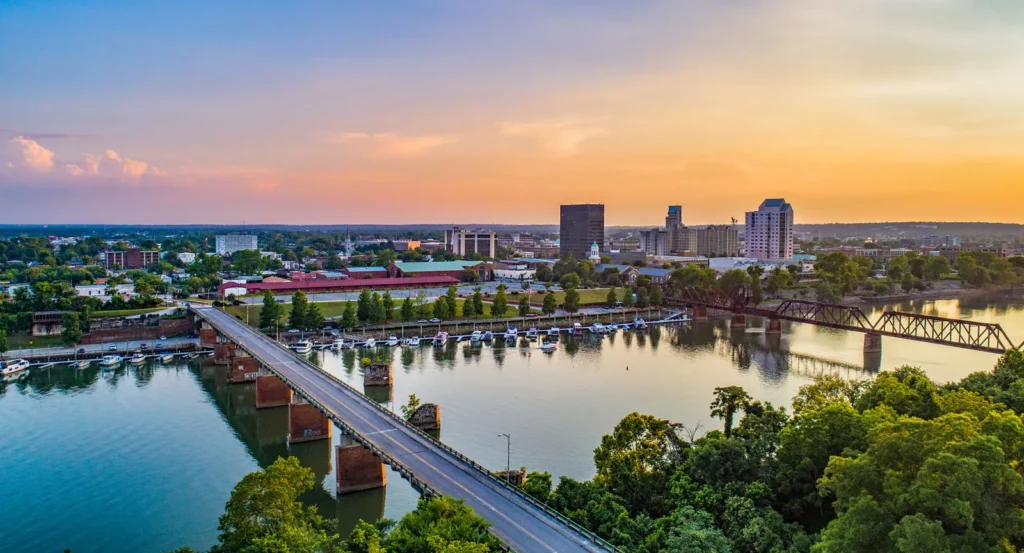Augusta, Georgia is widely recognized today for its vibrant culture, annual golf tournaments, and rich traditions. Yet, tucked away in its layered past lies a fascinating chapter when Augusta served, however briefly, as the state capital. This article explores that surprising period in Augusta’s history, examining the circumstances that led to its selection as a capital, the governmental activities that unfolded within its borders, and the enduring legacy that continues to shape the city. As we unravel the historical tapestry of Augusta, we invite you to journey back to a time when Georgia’s political landscape was in flux and Augusta found itself at the heart of the state’s governance. For more insights on Georgia’s hidden histories, visit Georgia Guider.
Historical Context of Augusta
Early Beginnings and Strategic Location
Founded in the mid-18th century, Augusta quickly emerged as one of Georgia’s most important settlements. Its strategic position along the Savannah River made it a hub for commerce, trade, and transportation. In an era when waterways were the primary arteries of economic activity, Augusta’s location offered not only commercial advantages but also strategic military importance. Early settlers recognized its potential as a meeting point between inland communities and coastal trade routes, setting the stage for its future prominence.
Augusta’s rapid growth was fueled by its role as a gateway to the interior of Georgia. The fertile lands surrounding the city supported thriving agricultural activities, while the river enabled the transportation of goods and people. As the American colonies moved toward independence, the burgeoning settlement of Augusta became increasingly significant, both economically and politically.
The Revolutionary Era and Shifting Political Priorities
The American Revolution radically altered the political and social landscape of the colonies. Georgia, one of the original thirteen colonies, experienced its own share of upheaval during and after the war. In the wake of the Revolution, the need for a centralized location for governance became paramount. Georgia’s political leaders sought a place that could serve as a unifying symbol for the new state—one that embodied the promise of progress and the spirit of independence.
At this time, Augusta was emerging not just as an economic center but also as a town of considerable civic pride. The city’s growing infrastructure, including public buildings and community institutions, made it a strong candidate for hosting the state government. It was during this transformative period that Augusta briefly ascended to the status of the state capital, marking a pivotal moment in its history.
Augusta’s Role in Early Statehood
Before Augusta assumed its role as the capital, the state’s administrative affairs were predominantly managed in coastal cities like Savannah. However, as the demographics and economic centers of Georgia shifted inland, there was a growing sentiment among state leaders to choose a capital that was more centrally located. Augusta, with its advantageous location and robust community infrastructure, presented itself as an ideal alternative.
During the post-Revolution years, Augusta became a beacon of progressive thought and innovation in governance. The city’s citizens and leaders alike were eager to demonstrate that a thriving, inland community could effectively manage the affairs of a newly independent state. This period of ambition and experimentation ultimately paved the way for Augusta’s brief but noteworthy role in Georgia’s political evolution.
Augusta as the Capital of Georgia
The Brief Capital Era
The designation of Augusta as Georgia’s capital was not a matter of gradual transition but rather a decisive, albeit temporary, shift. In the mid-1780s, political leaders determined that the traditional coastal seat of power was no longer ideally suited to the changing needs of the state. In 1785, Augusta was chosen to host the state legislature, marking its debut as the capital of Georgia. This decision was rooted in both geographic pragmatism and a desire to foster a sense of unity among Georgia’s increasingly diverse population.
During its tenure as the capital, Augusta was the stage for significant legislative sessions. Lawmakers convened to debate and pass measures that would shape the future of the state. The discussions held within Augusta’s halls were instrumental in laying the groundwork for Georgia’s governance structure. Despite its short duration as the capital, the period was marked by intense political activity and a commitment to establishing a functional state government.
Governmental Activities and Legislative Debates
While Augusta’s time as the capital lasted only for a brief legislative session, the impact of that session was far-reaching. The state legislature used this period to address critical issues such as land distribution, taxation, and the establishment of a judicial system. Debates during these sessions were characterized by a blend of idealism and pragmatism, as lawmakers navigated the challenges of forming a new government in a post-Revolution society.
Key figures in Georgia’s early history, many of whom hailed from Augusta or had strong ties to the community, played prominent roles during these sessions. Their efforts helped to articulate a vision for the state that balanced economic growth with the protection of individual rights. The legislative records from this period reveal spirited discussions and innovative proposals that would go on to influence Georgia’s legal and political traditions.
Augusta’s Infrastructure and Civic Pride
Augusta’s selection as the capital was also a testament to the city’s burgeoning infrastructure and civic spirit. Local leaders had invested heavily in building facilities that could accommodate governmental functions. Public buildings, meeting halls, and even temporary accommodations were arranged to host legislators and their staff. This display of organizational capability was a source of pride for the residents of Augusta, who saw in it an affirmation of their city’s potential.
Moreover, Augusta’s status as a temporary capital brought an influx of visitors, including politicians, merchants, and dignitaries from other regions. This period of heightened activity left an indelible mark on the city’s social and cultural fabric. Even after the capital was relocated, the memories of those intense sessions continued to influence the local community, contributing to a legacy of civic engagement and pride.
The Transition from Capital Status
Factors Leading to the Relocation
While Augusta’s time as the capital was a significant chapter in its history, it was always intended to be a temporary arrangement. Several factors contributed to the decision to relocate the state capital after the brief period of legislative activity. One of the primary considerations was geographic centrality. As Georgia continued to expand, there was growing recognition that a more centrally located city might better serve the needs of a rapidly evolving state.
Political dynamics also played a critical role in the decision. The shifting allegiances and priorities among state leaders, coupled with the practical challenges of maintaining a capital in a single location, led to the consensus that relocating the capital was in the best interest of the state. Discussions among legislators weighed the benefits of Augusta’s accessibility against the logistical and symbolic advantages offered by other locations.
Economic and Social Influences
Economic considerations were also at the forefront of the decision to move the capital. Augusta, while economically robust, was just one part of a state experiencing significant regional disparities. As other cities in Georgia grew in prominence, especially those with better connections to emerging trade routes and industries, the need for a more balanced representation in governance became apparent. The relocation of the capital was partly an effort to redistribute political power more equitably across the state.
Social influences cannot be underestimated in understanding the transition. The debates that took place during Augusta’s tenure as the capital highlighted the diverse interests of Georgia’s citizens. There was a growing realization that the state’s governance needed to be more inclusive, with a capital that was accessible to a broader segment of the population. In this context, relocating the capital was seen as a way to foster unity and ensure that all regions of Georgia felt adequately represented.
The Impact on Augusta
The decision to move the capital did not diminish Augusta’s importance in the annals of Georgia’s history. On the contrary, the brief period as the state capital became a celebrated part of the city’s heritage. Although the administrative functions were transferred elsewhere, the legacy of Augusta’s role as the capital continued to shape local identity. The memories of legislative sessions and civic pride were passed down through generations, imbuing the city with a sense of historical significance.
For the citizens of Augusta, the experience served as both a source of pride and a reminder of the city’s potential. It reinforced the idea that even a temporary role on the state’s political stage could leave an enduring impact. This legacy is one that is still celebrated today in local museums, historical markers, and community narratives—a testament to Augusta’s unique place in Georgia’s storied past.
Surprising Historical Insights and Legacy
Little-Known Facts About Augusta’s Capital Status
One of the most surprising aspects of Augusta’s history is just how brief and yet how impactful its role as the capital was. Many modern residents and visitors might not be aware that Augusta once hosted the very heart of state governance. Historical records indicate that during its tenure as the capital, Augusta was not only the site of crucial legislative debates but also a melting pot of ideas and innovations that would go on to influence Georgia’s future.
A fascinating detail often overlooked is the logistical ingenuity displayed during this period. With the sudden influx of legislators and officials, the local community mobilized rapidly, repurposing existing structures to accommodate government functions. Temporary government buildings were erected, and civic leaders worked tirelessly to ensure that the city could support its new role—even if only for a short time.
Cultural and Educational Impact
The experience of serving as the capital left an indelible mark on Augusta’s cultural and educational landscape. The period of legislative activity spurred the establishment of institutions dedicated to preserving the city’s historical legacy. Schools, libraries, and museums in Augusta today carry echoes of that transformative era, providing educational programs and exhibitions that celebrate the city’s brief stint as the center of state governance.
Local historians have unearthed numerous anecdotes and archival documents that offer a glimpse into life during Augusta’s capital era. These documents reveal that the legislative sessions were not only a forum for political debate but also a cultural event, drawing crowds from across the region. Public lectures, debates, and even informal gatherings helped to foster a sense of community and shared purpose among the citizens of Augusta.
Legacy in Modern Civic Life
The legacy of Augusta’s role as the capital is evident in the city’s modern civic life. Today, Augusta is a vibrant metropolis that embraces both its historical roots and its contemporary cultural identity. The pride stemming from its brief period as the state capital is woven into local traditions, influencing everything from public commemorations to the preservation of historic districts. Annual events and heritage festivals often include segments that pay homage to the city’s illustrious past, ensuring that the story of Augusta’s capital era remains alive in the public imagination.
This legacy also manifests in the form of civic engagement. Residents of Augusta continue to take an active interest in local governance, inspired by the pioneering spirit of their forebears. The democratic ideals and innovative practices that were once debated in Augusta’s makeshift government halls now serve as a foundation for modern civic participation. This deep-seated commitment to community and governance is a living testament to the city’s unique historical journey.
Augusta Today and Its Historical Significance
A Modern City with a Storied Past
Today, Augusta stands as a testament to resilience and reinvention. While the city is perhaps best known for its modern attractions—ranging from the world-renowned Masters Tournament to a thriving arts scene—its historical narrative continues to draw interest from scholars, tourists, and history enthusiasts alike. Augusta’s role as the state capital, though brief, is an integral part of that narrative, adding depth to its identity as a place of historical significance.
The stories of legislative debates, civic mobilization, and community pride are interwoven with Augusta’s modern achievements. The city has successfully balanced progress with preservation, ensuring that its historical landmarks are maintained even as new developments reshape the urban landscape. Historical sites related to its time as the capital serve not only as reminders of a bygone era but also as educational resources that inform current and future generations about the city’s foundational role in Georgia’s history.
Community Engagement and Preservation Efforts
In Augusta, there is a palpable sense of duty to preserve the past. Community leaders, historians, and local organizations work together to maintain archives, museums, and public spaces that commemorate the city’s unique heritage. This collective effort ensures that the legacy of Augusta’s capital era is not lost amidst the rapid pace of modern life.
Educational initiatives abound, with local schools and cultural institutions integrating lessons on Augusta’s historical significance into their curricula. Heritage festivals, guided tours, and public lectures offer residents and visitors alike the opportunity to engage with the city’s rich past. Such efforts are crucial in fostering an understanding of how historical events shape contemporary identity—a principle that resonates deeply with the mission of Georgia Guider.
The Enduring Spirit of Augusta
What makes Augusta truly remarkable is its enduring spirit—a resilience that has allowed the city to reinvent itself while never losing sight of its origins. The brief moment when Augusta served as the capital is celebrated not as an isolated incident, but as a critical juncture that helped define the trajectory of the state. The passion and determination exhibited by Augusta’s early citizens continue to inspire modern efforts to innovate while honoring tradition. This blend of progress and preservation is perhaps Augusta’s greatest legacy, ensuring that its story remains relevant in the tapestry of Georgia’s history.
Conclusion
The story of Augusta’s time as the capital of Georgia is a compelling narrative of ambition, innovation, and civic pride. Though its tenure as the seat of state government was brief, the impact of that period has resonated through the centuries, influencing both the cultural identity of Augusta and the broader historical trajectory of Georgia. From its strategic role as an economic and political hub in the post-Revolution era to its lasting influence on modern civic life, Augusta exemplifies the power of a community to shape history in even the most transient moments.
As we have seen, the factors that led to Augusta’s selection as the capital were as diverse as they were significant—ranging from geographic advantages and economic potential to the political aspirations of a newly independent state. The legacy of that era is preserved in the city’s infrastructure, its cultural institutions, and the enduring spirit of its people. Today, Augusta stands as a vibrant city that honors its past while looking confidently toward the future.
For those intrigued by this surprising chapter of history, Augusta offers a wealth of historical landmarks, educational resources, and community events that bring its capital era to life. The story of Augusta is a reminder that even a short-lived moment in history can leave an indelible mark on the fabric of a community. We invite you to explore more of this fascinating history and discover the many layers that define Augusta’s enduring legacy.
Whether you are a local resident, a history enthusiast, or simply curious about the rich tapestry of Georgia’s past, Augusta’s journey from a bustling river town to a brief capital, and finally to the modern city it is today, offers lessons in resilience, innovation, and community spirit. As you delve deeper into the archives and walk along the historic streets of Augusta, you’ll encounter not only stories of political debates and legislative sessions but also the heart and soul of a city that has continually reinvented itself.
The history of Augusta’s capital era may be a relatively short chapter, yet it encapsulates the transformative power of civic ambition and the enduring impact of community pride. By understanding and appreciating these historical nuances, we gain insight into how past decisions shape modern identities and influence the trajectory of entire regions. In Augusta, every street corner and historical marker whispers tales of a time when the city stood at the center of a new beginning for Georgia—a reminder that even transient moments can leave lasting legacies.
In celebrating Augusta’s rich past, we acknowledge a story of transformation that continues to inspire. The legacy of Augusta’s brief tenure as the state capital is not just a historical footnote—it is a testament to the city’s ongoing commitment to progress, preservation, and community engagement. As Augusta moves forward, it carries with it the lessons of its storied past, ensuring that every new chapter is enriched by the wisdom of those who came before.
For further exploration of Georgia’s history and the hidden stories of its cities, be sure to visit Georgia Guider, where history comes to life and every story invites you to rediscover the treasures of the Peach State.


